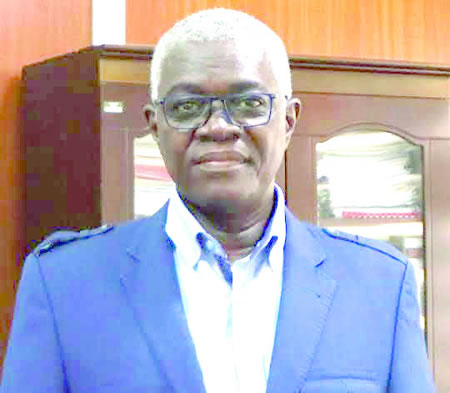
The Regional Representative for West Africa at the African Agriculture Technology Foundation (AATF), Dr Jean Baptiste at the first harvest of the TELA Maize variety in Abuja, highlighted the importance of the new maize variety to Nigeria and Africa in general. COLLINS NNABUIFE brings excerpts.
Give a little background about TELA maize.

What you are seeing here is one of the technologies where scientists harnessed the potentials of biotechnology to develop technology that will help farmers meet some issues related to food security and nutrition.
Tela maize is a climate-smart variety developed using biotechnology methods. In addition to being a climate-smart variety, it also enables you to control insects. Of course, you know that insects are one of the major constraints that reduce crop yield for our farmers. So, this maize variety is a triple-purpose technology. First of all, it confers the resistant to drought, secondly, it enables farmers to control fall armyworm, so at the end of the day, the benefit of all these is to enable farmers to increase yield and to be able to meet food security issues and also sell the extra so that they can have income and improve their livelihood.
There have been a lot of misconceptions about GMO especially when it comes to the issue of how it is being generated, how do you hope to pass the message across to the rural farmers?
In the development of this variety from product conception and to release, farmers were involved in the process through confined field trials and we allowed farmers to give feedback on the technology. So, at every step of development of the variety, farmers were involved so that at the end of the day, farmers would not complain that they were not associated regarding the selection of a certain number of traits that they wanted.
The second thing is that during the development of this product, it followed all the steps in the regulation. The product was tested by the National Biosafety Management Agency (NBMA) and we also ensured that the environment will not be affected when the product is released, so no targeted organisms, not only humans, but animals like rodents, bees, and others were evaluated.
So, once NBMA says it is safe, you can trust them, the product is safe, so TELA maize is safe, you can consume it with no fear.
Some people see GMO as foreign imposition on Nigeria, what can you say about that?
This product was tested by Nigeria scientists and it responded to constraints that are present in Nigeria such as insects. Why we ended up using biotechnology to solve the issues related to insects is because it is sometimes impossible to find the source of resistance to insects in nature or in the germplasm available like in Nigeria. so, that is why scientists of Institute for Agricultural Research (IAR), Zaria use biotechnology to come to the rescue to address the issue of lack of resistance to the insects’ damaging crops which are fall armyworm and stem borer.
What is that special thing that Nigerians did that Africa and the world are learning from regarding TELA maize?
I think Nigeria is really inspiring other countries in Africa as they have taken the leadership of exploring the potentials of biotechnology to solve food security issues. I will tell you for instance cowpea was the first genetically modified variety released in the world and it was done by Nigerian scientists and Nigerian regulation. So, I think Nigeria should be proud of that. It was so well done that other countries were inspired.
I would like to inform you that the Pod Borer Resistant Cowpea which was developed in Nigeria is the one that was released in Ghana. So, I think Nigeria has done a lot for biotechnology and for farmers, it is really inspiring.
How will you address the fears of other stakeholders that in the long run, Nigeria may lose its seed system to foreign?
I think that the conventional method will still coexist with the biotechnology method and there is no fear of that, also, trace your scientists, they are from this country, they will not give you some that will be harmful to humans and animals.
Does Nigerian soil have the potency to work with both biotechnology and conventional breeding?
There is no difference between biotechnology and conventional seeds. The only difference is the gene that was introduced to confer resistance to the insects. So, any other characteristics of the two varieties are the same except for the gene, so it will not affect the soil as being a GM crop.
READ ALSO: Northern govs, Emirs reject tax reform bill








